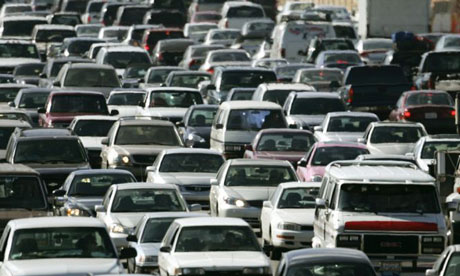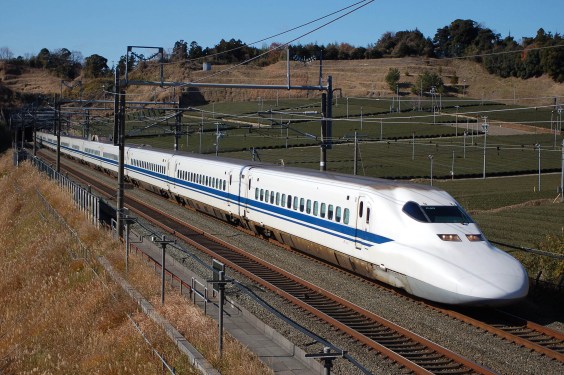As gas tax revenues wane, making it harder to finance a long-term transportation bill, ideas are beginning to circulate about how to save the (very poorly named) Highway Trust Fund. Some say the gas tax needs to rise. Others say fewer programs need to be financed out of the fund, which pays for all federal surface transportation investment, including transit. More and more, we’ve heard highway boosters say the Highway Trust Fund should go back to olden times when it was just for highways.

With key leaders like John Mica and Barbara Boxer cool on stripping transit out of the fund, we'd be surprised if it made it into the next long-term transportation bill. But the idea has been getting a lot of airtime lately, and we can expect it to figure into the legislative debate.
Senate EPW Ranking Republican James Inhofe said last month that the trust fund “used to have surpluses” until “all these hitchhikers came along” like transit, inter-city rail, and bike infrastructure.
AAA got in trouble this winter when top executive Don Gagnon opined that the “flexibility” of the Highway Trust Fund over the last two decades “dovetails – not coincidentally – with an increasingly deteriorated highway system.” He said a gas tax increase wouldn’t be necessary if the country refocused the Highway Trust Fund “solely on its original purpose – the nation’s critical highway system.” Gagnon suggested letting the general fund pay for other expenses [PDF].
The vilification of transit as the source of transportation funding woes has no basis in the historical record. The Highway Trust Fund was founded in 1956 and has had a mass transit account since 1983. The fund’s financial troubles started much later – the first bailout from the general fund came in September 2008 – and can be directly attributed to the failure to raise the gas tax since 1993.
But the question of taking transit out of the trust fund reared its head again this week, at AASHTO’s legislative briefing for state DOT officials. A Republican Congressional staffer criticized the “disproportionate priorities” in the president’s budget proposal (which expands highway spending by 48 percent and transit spending by 127 percent) and sounded the now-familiar theme of reserving Highway Trust Fund money just for highways.
“Funding out of the trust fund, and motor fuel taxes, can no longer be the primary mechanism by which transit is funded,” said the staffer. “It’s not that transit is a bad thing – or that highways are a bad thing – but they’ve been placed in this zero-sum game where they usually cannot exist together from a single funding source.”
Another Republican staffer admitted frustration that “there seems to be this fight – do we prefer transit over highways?” She said the issue was simply that “there may be other funding sources for these programs.”
What funding sources? The Highway Trust Fund – which both President Obama and Rep. John Mica promise will soon get a long-overdue name change to “Transportation Trust Fund” – is the only dedicated source of transportation money that exists. That’s why the recent SAFETEA-LU extension could pass without going through the gauntlet of the Republican spending-cut machine. If it came out of general funds it would have to compete against everything else in the entire budget, including the need to pay down the deficit.
Shutting out transit would eliminate its guaranteed funding stream and send it out into the wild to compete for scarce – and ever scarcer – resources against needs as urgent and diverse as education, health care, and law enforcement. That would ensure the decimation of our already underfunded transit system, especially in this era of slashing budgets.
The proposal to remove the transit account from the trust fund "perpetuates the idea that highways have this funding stream that they’ve historically had and they should have it forever, when it was really set up for a specific purpose,” said Sarah Kline, policy director at Reconnecting America. “The whole construct of the conversation is disadvantageous to transit.”
She said it’s important to think about transportation as an integrated network and not keep each mode siloed, with its own funding source. She turned the whole “back to the basics” argument on its head: “I am a ‘back to basics’ kind of person,” Kline said. “We should be funding our transportation needs from our transportation program.”
The idea that transit is somehow stealing what drivers pay for the services they use (i.e., roads) is also disingenuous. The gas tax doesn’t fund the specific road a driver uses – it funds other transportation needs around the country. Gas tax revenues don't come close to paying for the full costs of roads.
The truth is that both roads and transit receive subsidies. The question is what priorities do we want to set with this spending? The country’s massive subsidies for oil and roads have incentivized driving for decades, fostering a transportation system characterized by so much traffic and congestion that it doesn't even work that well for drivers.
The 20 percent of the trust fund that goes to transit helps give people other options besides driving. Without that investment, there would be fewer transit riders and more cars on the road, creating more congestion, and fueling the demand for more highway capacity, which would further draw down the trust fund.
Transit systems are not separate from road systems. It makes no sense to put a wall between transit funding and the rest of our transportation needs.





